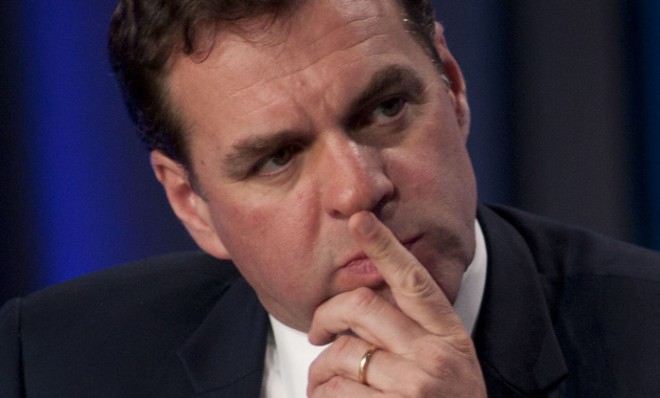Niall Ferguson's anti-gay comments about economist John Maynard Keynes: The fallout
The Harvard historian ruffled feathers with his crude explanation of a famous Keynes quote

A free daily email with the biggest news stories of the day – and the best features from TheWeek.com
You are now subscribed
Your newsletter sign-up was successful
If you follow a few economists on Twitter, you already know that Harvard historian Niall Ferguson was the target of some high-profile wrath this weekend.
Last week, at the Tenth Annual Altegris conference in California, Ferguson reportedly made some off-color remarks to a roomful of 500 financial advisors and investors about John Maynard Keynes' famous quote, "In the long run we are all dead." Tom Kostigen, an editor at Financial Advisor magazine who broke the story, explained:
Ferguson responded to a question about Keynes' famous philosophy of self-interest versus the economic philosophy of Edmund Burke, who believed there was a social contract among the living, as well as the dead. Ferguson asked the audience how many children Keynes had. He explained that Keynes had none because he was a homosexual and was married to a ballerina, with whom he likely talked of 'poetry' rather than procreated. [Financial Advisor]
Ferguson argued that "it's only logical that Keynes would take this selfish worldview because he was an 'effete' member of society. Apparently, in Ferguson's world," said Kostigen, "if you are gay or childless, you cannot care about future generations nor society."
The Week
Escape your echo chamber. Get the facts behind the news, plus analysis from multiple perspectives.

Sign up for The Week's Free Newsletters
From our morning news briefing to a weekly Good News Newsletter, get the best of The Week delivered directly to your inbox.
From our morning news briefing to a weekly Good News Newsletter, get the best of The Week delivered directly to your inbox.
The backlash was quick and angry. "Saying that Keynes' economic philosophy was based on him being childless would be like saying that Ferguson's own economic philosophy is based on him being rich and famous and therefore not caring about the plight of poor unemployed people," Henry Blodget of Business Insider said. Binyamin Appelbaum of The New York Times tweeted:
By Saturday afternoon Ferguson had posted an "unqualified apology" on his website, calling his comments "as stupid as they were insensitive."
"My colleagues, students, and friends — straight and gay — have every right to be disappointed in me, as I am in myself. To them, and to everyone who heard my remarks at the conference or has read them since, I deeply and unreservedly apologize," he wrote.
But not everyone was ready to forgive. Economist Justin Wolfers tweeted:
A free daily email with the biggest news stories of the day – and the best features from TheWeek.com
Meanwhile, the Times' Keynesian economist Paul Krugman, in an article that didn't mention Ferguson by name, defended Keynes' original quote, saying:
As I've written before, Keynes's point here is that economic models are incomplete, suspect, and not much use if they can't explain what happens year to year, but can only tell you where things will supposedly end up after a lot of time has passed. It's an appeal for better analysis, not for ignoring the future; and anyone who tries to make it into some kind of moral indictment of Keynesian thought has forfeited any right to be taken seriously. [New York Times]
Jonah Goldberg of National Review noted that Ferguson's theory that gays make poor forward-thinkers, though offensive, is hardly original:
I don't endorse the theory and completely understand why it offends people. But it's hardly as if it's unheard-of in academia to speculate that one's sexual orientation (or race, or gender, etc.) can influence a person's views on public policy. Is it really nuts now to think that having kids changes a person's time horizons?
More relevant, this theory about Keynes is hardly new. Joseph Schumpeter, I thought famously, suggested that Keynes's childlessness was a key issue. In his obituary of Keynes, Schumpeter wrote: "He was childless and his philosophy of life was essentially a short-run philosophy." [National Review]
In fact, as recent as 2008, in a story about the economic meltdown, Harvard economist Greg Mankiw espoused a similar idea, without bringing Keynes' sexuality into it:
The longer-term problem we now face, however, may be more serious than any that Keynes ever envisioned. Passing a larger national debt to the next generation may look attractive to those without children. (Keynes himself was childless.) But the rest of us cannot feel much comfort knowing that, in the long run, when we are dead, our children and grandchildren will be dealing with our fiscal legacy. [New York Times]
Ezra Klein of The Washington Post argues that actually, if gay people are judged by their economic behavior, they're "unusually future-focused."
Quite a few studies and surveys have found that gay couples save much more than straight couples. Brighita Negrusa and Sonia Oreffice, for instance, analyzed census data and found that even after controlling for age, education and other socioeconomic factors, "gay and lesbian couples own significantly more retirement income than heterosexuals." Part of the difference, of course, is that gay couples are much less likely to have children than straight couples, which means they have more household income left over to save...
The same dynamic, of course, is present in many families, where parents go into debt spending on themselves and their children now, and the children need to support the parents later. "Debts do not simply disappear by magic," Ferguson likes to say.
The fact is that Ferguson would like our government to act a bit more like the nation's gay couples than its straight couples and stop doing so much spending and investing now and begin doing more saving for later. [Washington Post]
Carmel Lobello is the business editor at TheWeek.com. Previously, she was an editor at DeathandTaxesMag.com.


